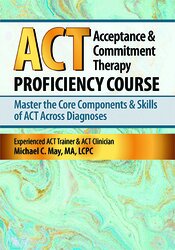

This Acceptance and Commitment Therapy (ACT) Proficiency Course recording is essential for any clinician with a difficult-to-treat client on their caseload!
ACT has long been established as effective in treating clients with a variety of clinical diagnoses.
Now, you can master the core competencies and skills used by ACT clinicians!
Watch ACT expert and clinician, Michael C. May, MA, LCPC, and he’ll walk you step-by-step through using the six core processes of Acceptance and Commitment Therapy in session. For each of the six components, you’ll learn interventions and strategies that you can use in your practice immediately.
You’ll have plenty of opportunities for practice through in-depth case studies and targeted experiential exercises – allowing you to really hone your skills.
Clinicians new to ACT will find this course transparent and easy to understand, while experienced ACT clinicians will discover new, in-depth insights that will solidify comprehension of ACT concepts and expand your repertoire of ACT interventions.
This online program is worth 6.25 hours CPD.
| File type | File name | Number of pages | |
|---|---|---|---|
| Manual - ACT Proficiency Course (4.76 MB) | 27 Pages | Available after Purchase | |
| Manual - ACT Proficiency Course - French (4.8 MB) | 27 Pages | Available after Purchase | |
| Manual - ACT Proficiency Course - Italian (4.8 MB) | 27 Pages | Available after Purchase |

Michael C. May, MA, LCPC is a psychotherapist in private practice and an ACT Trainer. He is a founding partner of Compassionate Psychological Care, LLP, a clinic that provides a wide-range of psychological services with offices in Chicago and Highland Park, IL. Within his private practice, his clinical work is focused on anxiety-related presenting concerns, primarily Panic Disorder and Obsessive-Compulsive Disorder. Michael is also co-founder of Enriched Couples LLC, a company focused on utilizing applied behavioral science in conjunction with financial literacy training to aid young couples in undermining toxic experiential avoidance and building vital and valued relationships.
Michael has received advanced training in various contextual behavioral approaches to psychotherapy including Acceptance & Commitment Therapy (ACT) and Dialectical Behavioral Therapy (DBT) and regularly provides workshops and professional trainings on Acceptance & Commitment Therapy. Michael is a Licensed Clinical Professional Counselor in the State of Illinois. He is a member of the Association for Contextual Behavioral Science and the Association for Behavior Analysis International.
ACT Foundations: What You Need to Know
THE CORE CONCEPTS OF ACT
Acceptance: Combat Experiential Avoidance
Defusion: Break Down Thoughts as Barriers
Self-As-Context: Aid Clients in Distancing Themselves from Their Thoughts
Contact with the Present Moment: Mindfulness Strategies to Reduce Worry about the Past & Future
Values: Guide Clients in Identifying & Clarifying What Matters
Committed Action: Establish Values-Consistent Patterns of Behavior
ACT in Action: Utilize ACT with Specific Clinical Populations
| 5 |
|
| 4 |
|
| 3 |
|
| 2 |
|
| 1 |
|
Satisfaction Guarantee
Your satisfaction is our goal and our guarantee. Concerns should be addressed to info@pesi.co.uk or call 01235847393.
Please wait ...